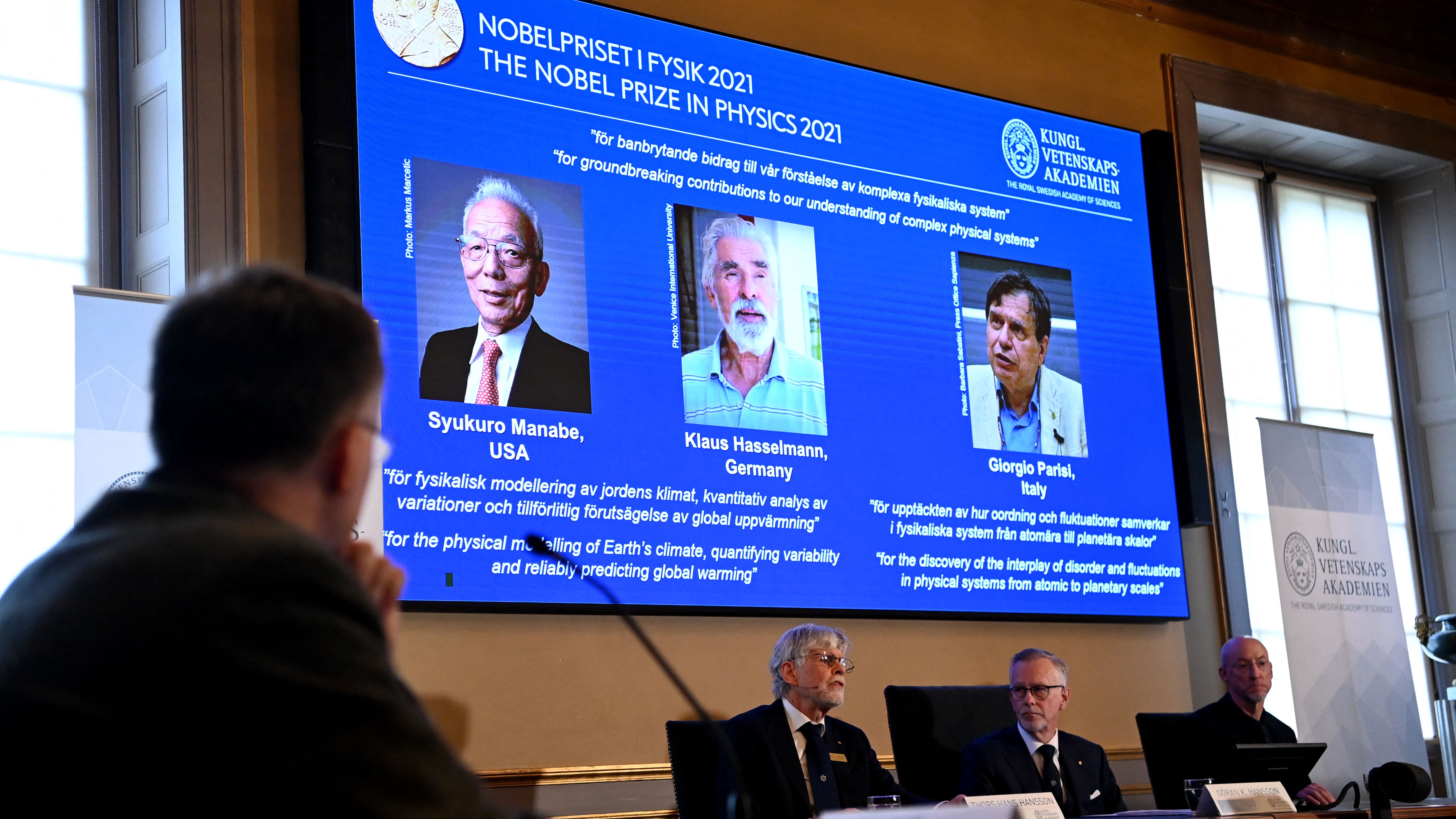Nobel prize in physics goes to trio whose research alerted the world to climate change
They showed how small changes could radically transform complex systems.

The 2021 Nobel Prize in physics has been awarded to a trio of scientists whose work laid the foundations for how we understand complex physical systems, including Earth's climate.
Syukuro Manabe, of Princeton University in New Jersey, and Klaus Hasselmann, formerly of the Max Planck Institute for Meteorology in Hamburg, Germany, will share one-half of the prize "for the physical modeling of Earth's climate, quantifying variability and reliably predicting global warming." Giorgio Parisi, of Sapienza University of Rome, will receive the other half "for the discovery of the interplay of disorder and fluctuations in physical systems from atomic to planetary scales," the Royal Swedish Academy of Sciences, which is responsible for selecting the Nobel laureates in physics, announced Tuesday (Oct. 5).
Such complex systems are inherently difficult to understand, as they are characterized by both randomness and disorder, according to a statement from the Royal Swedish Academy of Sciences. "This year's Prize recognises new methods for describing them and predicting their long-term behaviour," the statement said.
Related: Images of melt: Earth's vanishing ice
Manabe began this work in the 1960s, as the first person to explore how Earth's energy balance — the difference between the amount of the sun's energy received by Earth compared with the energy sent back to space — could affect atmospheric movements. With this understanding, he demonstrated the link between more carbon dioxide in the atmosphere and increased temperatures at Earth's surface — work that is used in climate models today.
Roughly 10 years later, Hasselmann made a model that linked weather with climate, showing how climate models could make reliable long-term predictions in spite of the varied and chaotic nature of short-term weather patterns. This work also allowed him to develop methods that spotted the telltale "fingerprints" of acute events, both natural and human, that impacted the climate. These methods were later used to prove that increases in atmospheric temperatures resulted from carbon dioxide emissions from human activities, such as the burning of fossil fuels.
Around 1980, Parisi followed up this work with a more theoretical look at how hidden patterns could be spotted in complex systems. By investigating a metallic alloy called spin glass — a material in which iron atoms that are dispersed across a grid of copper lead to significant changes to the material's magnetic properties — he described how seemingly small adjustments to large systems can have profound effects. This led to many subsequent insights, not just into the physics of the climate but also in fields as diverse as mathematics, biology, neuroscience and machine learning.
Sign up for the Live Science daily newsletter now
Get the world’s most fascinating discoveries delivered straight to your inbox.
"The discoveries being recognised this year demonstrate that our knowledge about the climate rests on a solid scientific foundation, based on a rigorous analysis of observations," Thors Hans Hansson, chair of the Nobel Committee for Physics, said in the statement. "This year's Laureates have all contributed to us gaining deeper insight into the properties and evolution of complex physical systems."
The award comes just before the 26th United Nations Climate Change Conference, which will be held in Glasgow, Scotland, in November. At the conference, countries are expected to negotiate plans for urgent and radical reductions in greenhouse gas emissions over the next decade.
On Aug. 9, a landmark report from the U.N.'s Intergovernmental Panel on Climate Change issued a stark warning that Earth is expected to reach a critical threshold: a global temperature increase of 1.5 degrees Celsius (2.7 degrees Fahrenheit) due to climate change within the next 20 years.
The report, which U.N. Secretary-General António Guterres described as a "code red for humanity," warns that increasingly extreme heat waves, droughts and floods will become more common as the planet warms.
"The alarm bells are deafening, and the evidence is irrefutable: Greenhouse gas emissions from fossil fuel burning and deforestation are choking our planet and putting billions of people at immediate risk," Guterres said in a statement. "If we combine forces now, we can avert climate catastrophe. But … there is no time for delay and no room for excuses."
The award comes with a prize of 10 million Swedish kronor ($1.15 million) one-half of which will be shared equally between Manabe and Hasselmann. The other half will be given to Parisi.
Originally published on Live Science.

Ben Turner is a U.K. based staff writer at Live Science. He covers physics and astronomy, among other topics like tech and climate change. He graduated from University College London with a degree in particle physics before training as a journalist. When he's not writing, Ben enjoys reading literature, playing the guitar and embarrassing himself with chess.










